人教版(2019)必修第一册:Unit 4 Natural Disasters Words and Expressions课件(88张ppt)
文档属性
| 名称 | 人教版(2019)必修第一册:Unit 4 Natural Disasters Words and Expressions课件(88张ppt) | 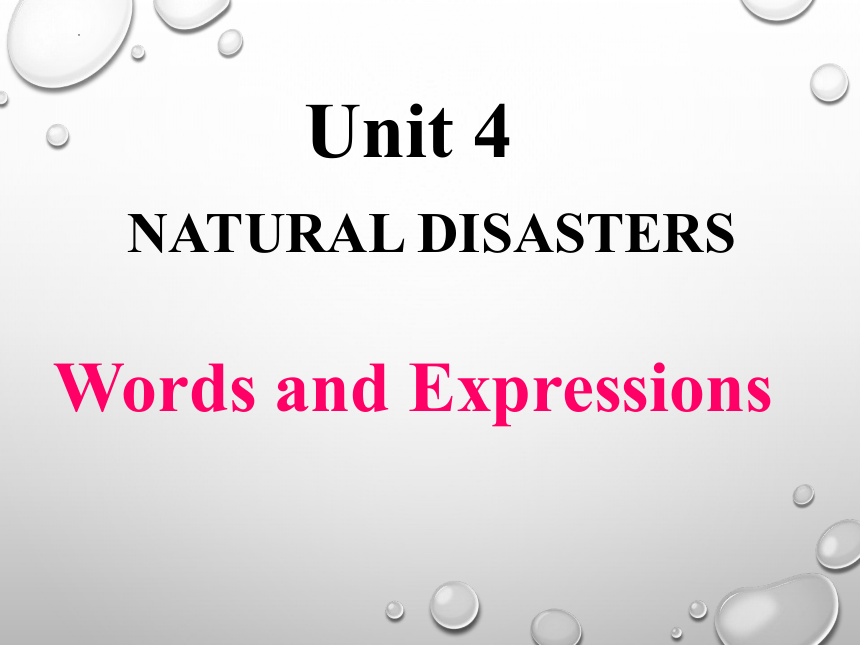 | |
| 格式 | pptx | ||
| 文件大小 | 26.7MB | ||
| 资源类型 | 教案 | ||
| 版本资源 | 人教版(2019) | ||
| 科目 | 英语 | ||
| 更新时间 | 2022-03-01 21:59:57 | ||
图片预览

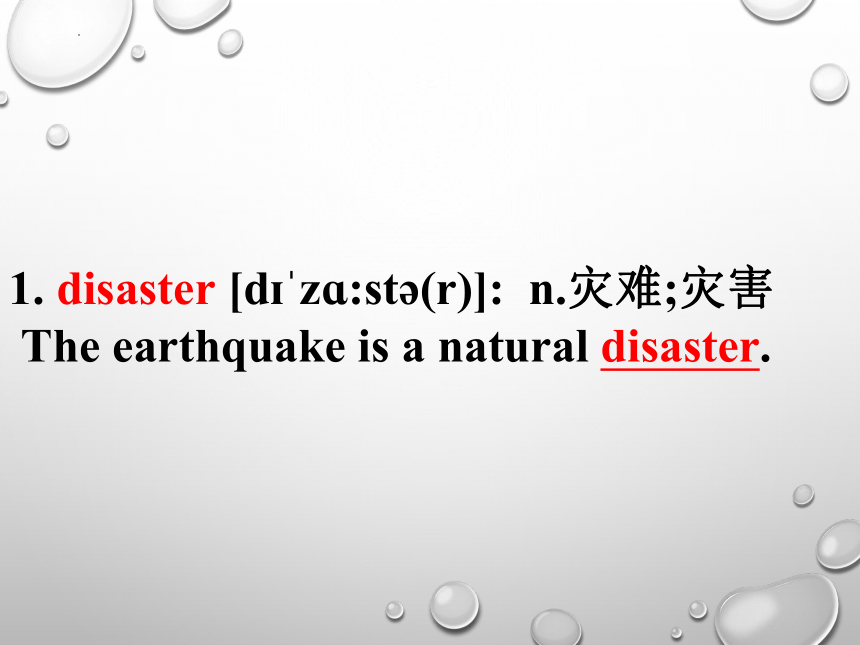
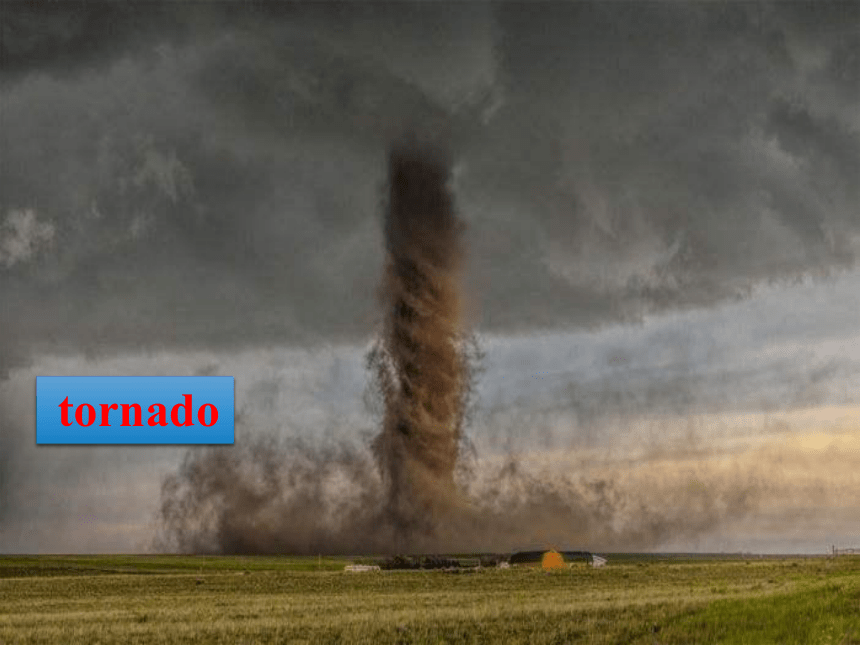
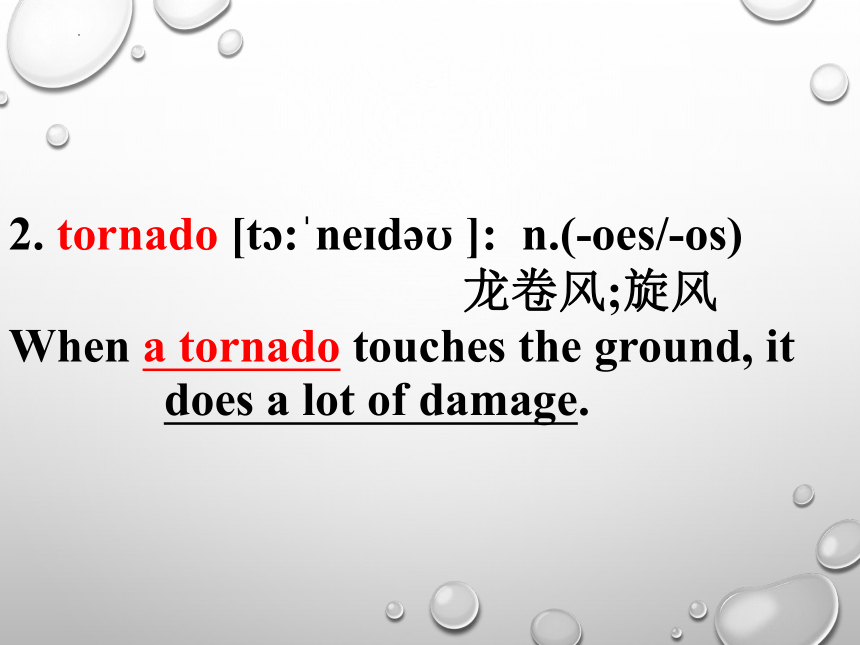
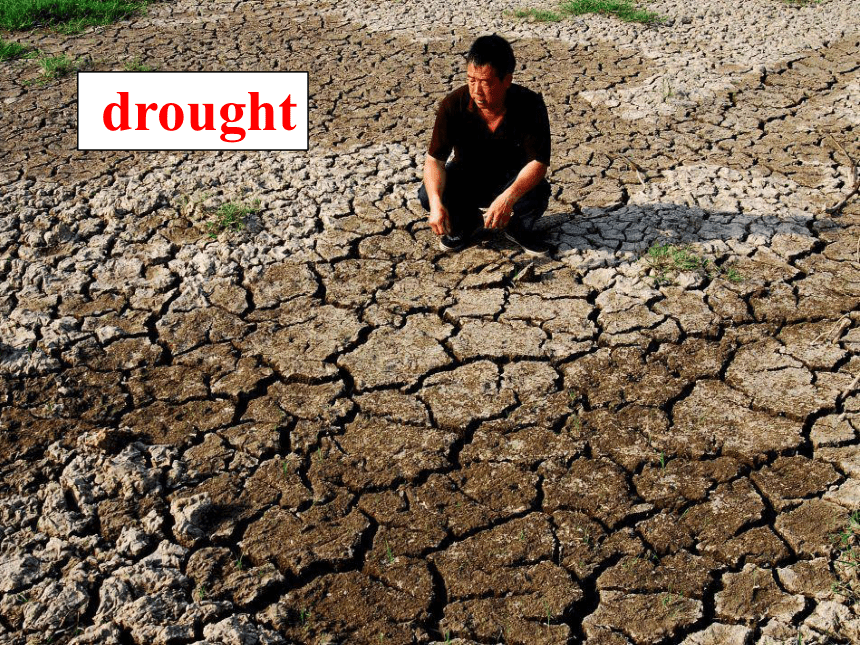
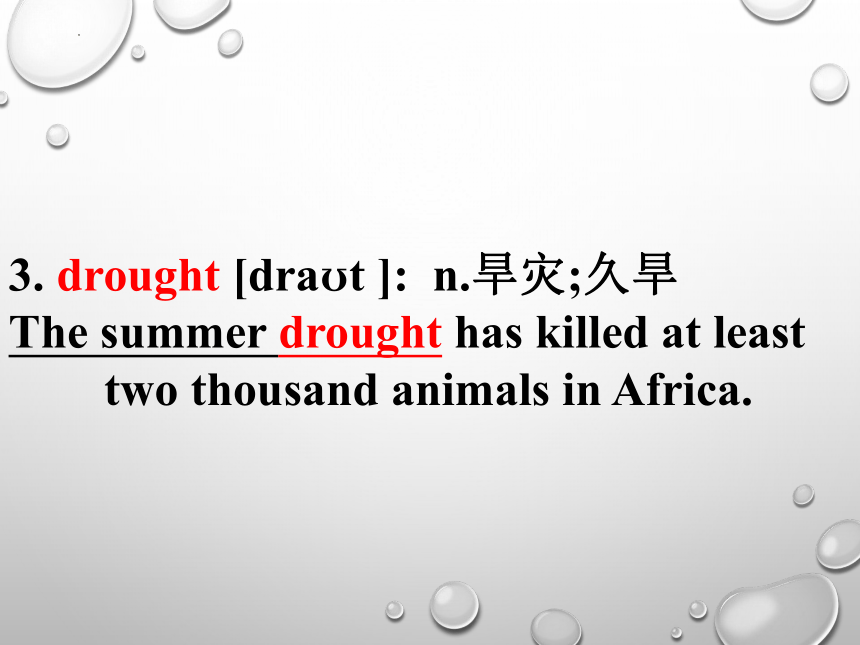
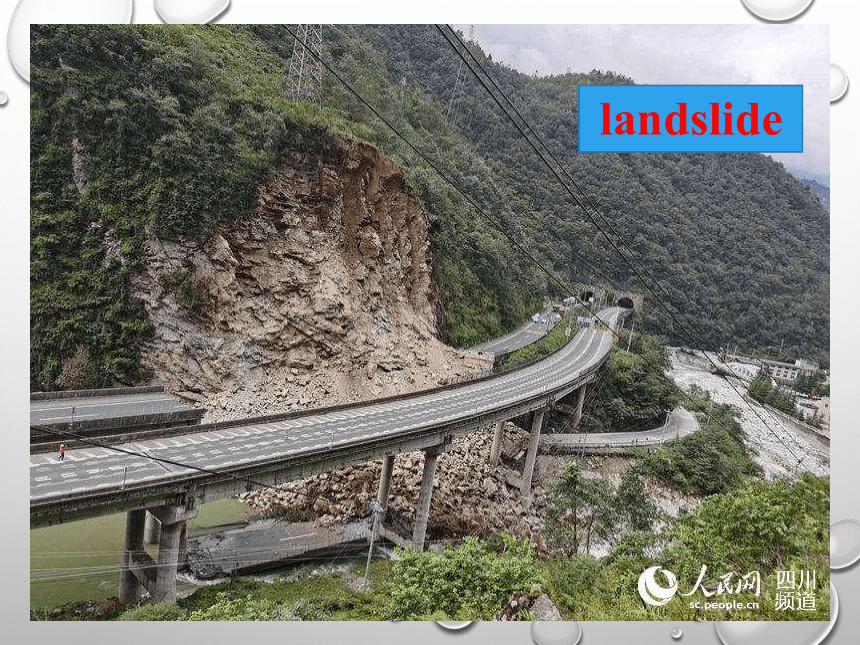
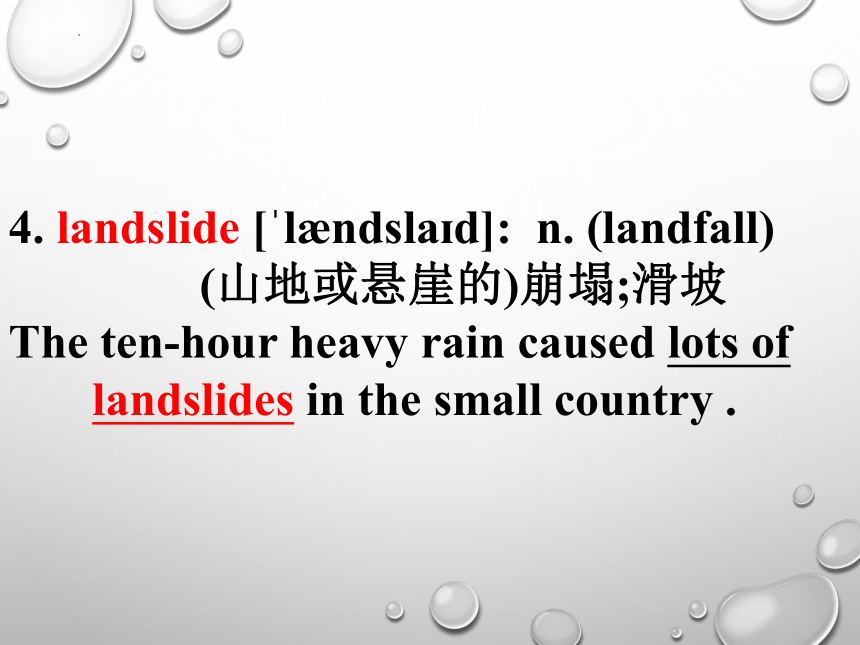
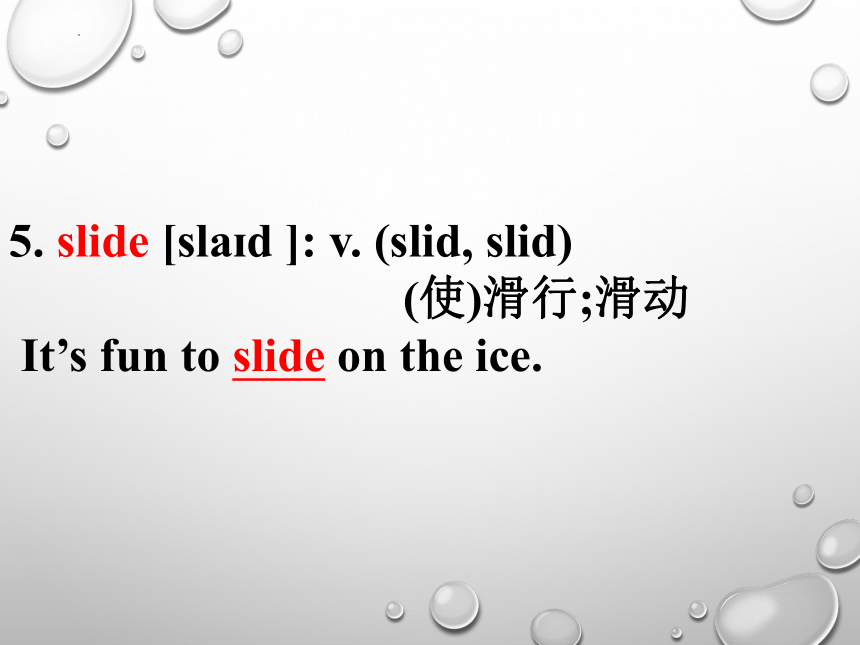
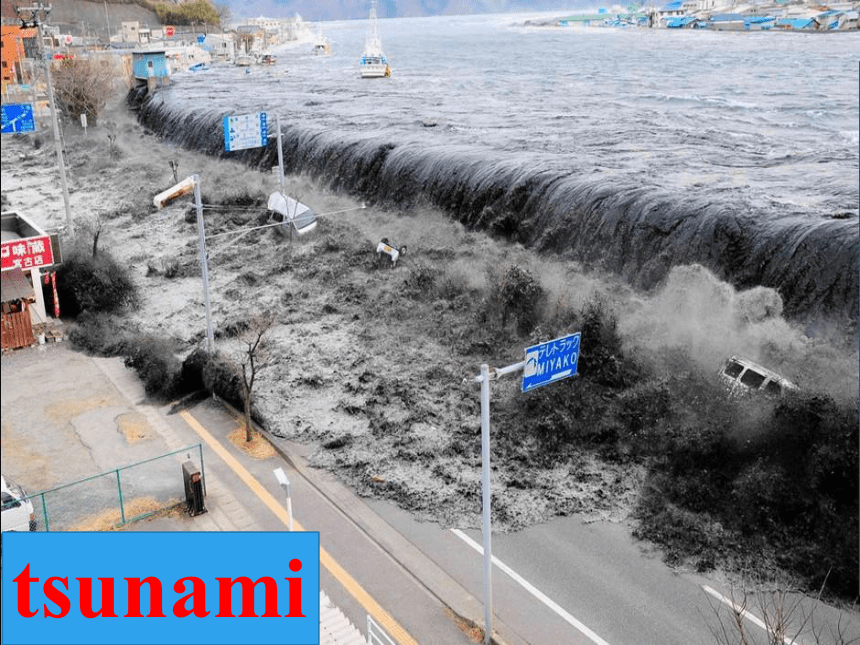
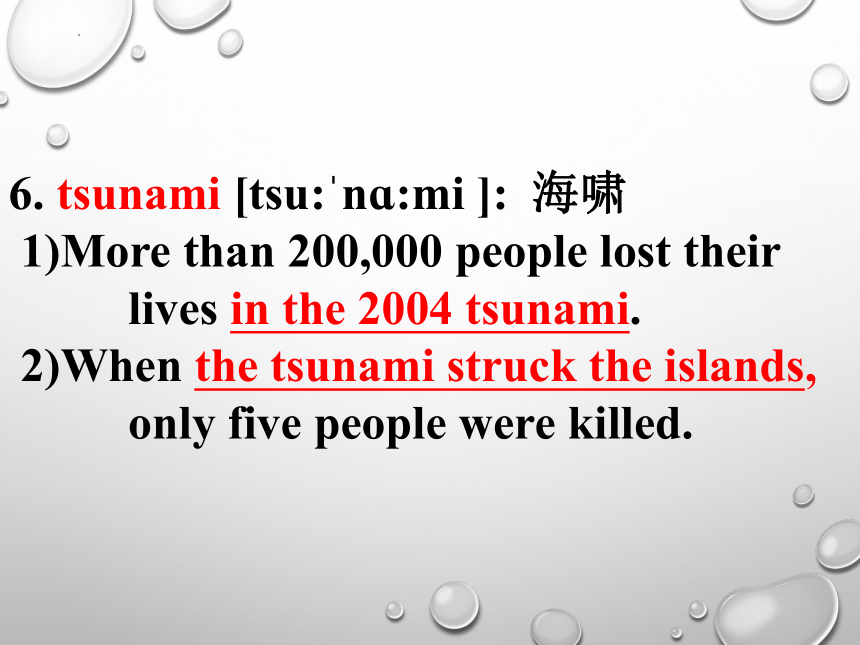
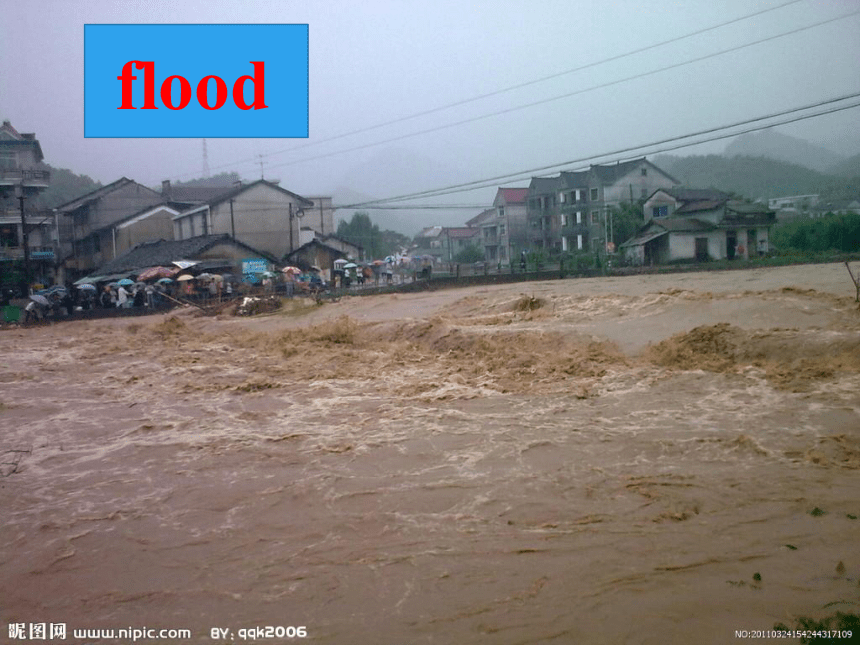
文档简介
(共88张PPT)
Unit 4
NATURAL DISASTERS
Words and Expressions
1. disaster [d zɑ:st (r)]: n.灾难;灾害
The earthquake is a natural disaster.
tornado
tornado
2. tornado [t : ne d ]: n.(-oes/-os)
龙卷风;旋风
When a tornado touches the ground, it
does a lot of damage.
drought
3. drought [dra t ]: n.旱灾;久旱
The summer drought has killed at least
two thousand animals in Africa.
landslide
4. landslide [ l ndsla d]: n. (landfall)
(山地或悬崖的)崩塌;滑坡
The ten-hour heavy rain caused lots of
landslides in the small country .
5. slide [sla d ]: v. (slid, slid)
(使)滑行;滑动
It’s fun to slide on the ice.
tsunami
6. tsunami [tsu: nɑ:mi ]: 海啸
1)More than 200,000 people lost their
lives in the 2004 tsunami.
2)When the tsunami struck the islands,
only five people were killed.
flood
7. flood [fl d]: n. 洪水;大量
v.淹没;大量涌入 ;使灌满水
flood in/into…大量涌入…
There was a great flood in Linhai last year.
The river is in flood. 河水泛滥。
The river has flooded the whole village.
volcanic eruption
8. volcanic eruption [v l k n k r p n]:
火山喷发
The place was recently visited by a
serious volcanic eruption.
9. magnitude [ m ɡn tju:d ]: n.(地)震级; 重大
What was the magnitude of the earthquake in Ecuador
地震按震级大小的分类情况:
弱震:震级小于3 级的地震。
有感地震:震级等于或大于3级、小于或
等于⒋5级的地震。
中强震:震级大于⒋5级,小于6级的地震。
强震:震级等于或大于6 级的地震。
唐山地震:8.2级(24万多死亡) (1976.7.28)
汶川地震:8级(8万7千多死亡) (2008.5.12)
智利地震:9.5级(6千多死亡) (1960.5.22)
智利地震是世界有记录的最大地震。
rescue
10. rescue [ reskju: ]: n./v. 营救;救援
1)They rescued the boy from the earthquake.
2)rescue sb. (from sth.)把…从…解救出来
come to the / sb.’s rescue 进行援救
1、Finally they __________(rescue) by helicopter.
2、It took the firefighters 5 hours to rescue the boy ________ the well.
3、A wealthy businessman came to _________(they) rescue with a generous donation.
were rescued
from
their
11. damage [ d m d ]: v. 损害;破坏
n.损坏;损失
damage sth=do/cause damage to…
对…造成损害
His car was badly damaged in the accident.
严重受损
1、The accident caused some damage ________ my car, but it’s nothing serious.
2、Smoking seriously _________ (damage) your health.
3、Several cars _________(damage) in crash which happened last night.
to
damages
were damaged
12. destroy [d 'str ]: v.摧毁;毁灭
(destroyed/destroying)
About 2,400 homes were destroyed in
the wildfire.
(damage destroy ruin)
damage: 指部分性的,不严重的破坏 。
destroy: 严重的破坏 ,往往不可修复。
ruin: 比destroy造成的破坏更严重。
也可指破坏名声,期望等等。
1)Their houses were damaged by the
earthquake.
2)The enemy destroyed the city.
3)The storm ruined the crops.
13. evacuate [ v kjue t]: v.
疏散;撤出;撤离
Almost 8,800 people were evacuated
before the typhoon.
helicopter
by helicopter
14. helicopter [ hel k pt (r) ]: n. 直升机
Planes and helicopters were used to
fight the fire.
15. death [deθ]: n. 死;死亡
die: v. 死亡
dead: adj. 死的
pass away: 去世
deadly: 致命的
1)The wildfire caused no deaths and no
injuries.
2)The flood caused eight deaths.
16. affect [ ‘fekt]: v. 影响; (疾病)侵袭;
感染;深深打动
affection: n. 喜爱;钟爱
affecting : adj. 感人的
have an affection for … 喜爱
1)In the flood 82 people were killed and
500,000 people were affected.
2)Their opinions will not affect my decision.
2)They were deeply affected/moved/
touched/struck by her words.
17. shelter [' elt ]: n.避难处;居所;庇护
v.保护;掩蔽 ;躲避(风/雨/危险)
under the shelter of在……的庇护下
1)Shelters were set up for the homeless
by the government.
2)they were standing under the shelter of a huge tree.
shelter/protect ...from...: 保护...免遭...
1)We must shelter/protect the people from
the hurricane.
18. crack [kr k]: n.裂纹;裂缝
v. (使)破裂
There were deep cracks that appeared in the well walls.
19. as if/though: 似乎;好像;仿佛
1)It seemed as if the world were coming
to an end.
2)It looks as if it is going to rain hard.
as if 似乎, 好像 = as though
e.g. She spoke to me as if she knew me.
1)虚拟语气(说话者主观想象或夸大的比喻)
2)陈述语气,时态一致
When a pencil is partly in a glass of water, it looks as if it were broken.
当铅笔一部分放进水里,看起来好像折断了似的。(虚拟)
It looks as if it's going to rain.
看样子天要下雨了。(陈述语气)
(是事实或可能性很大)
as if 后的从句可用两种语气
(3)as if引导的虚拟语气
①The woman loves the children as if she were their mother.
这位女士爱这些孩子,好像她就是他们的妈妈一样。
(与现在事实相反,从句用一般过去式或者were)
②He talks about Rome as if he had been there before.
他说起罗马来好像他以前去过那里似的。
(与过去事实相反,从句用过去完成时had done/ had been)
③He opened his mouth as if he should say something.
他张开嘴好像要说什么。
(与将来事实相反,从句用should do,were to do,动词过去式)
20. ruin ['ru: n]: n./v. 破坏;毁坏 (pl.ruins)
(be/lie) in ruins : 严重受损;破败不堪
1)In less than one minute, a large city
lay in ruins.
2)The bad weather will ruin your trip.
in ruins
21. percent [p sent]: n. 百分之 ...
50 percent is enough.
基数词+percent,动词用单数。
About 75 percent of the city’s factories
and buildings, 90 percent of its homes,
and all of its hospitals were gone.
基数词+percent+of+名词作主语,动词看名词。
brick
22. brick [br k]: n. 砖;砖块
Bricks covered the ground like red autumn
leaves, but no wind could blow them
away.
23. metal ['metl/]: n. 金属
medal: 奖章
model: 模特
modern: 现代的 ; 现代化的
The railway tracks were now useless
pieces of metal.
24. shock [ k]: v.(使)震惊
n.震惊;令人震惊的事;休克
1)in shock: 震惊; 吃惊
People were in shock – and then, later that afternoon, another quake shook Tangshan again.
2)His sudden death was a great shock to
his family.
1)The news will shock the whole world.
(surprise --- surprised --- surprising)
(shock --- shocked --- shocking)
be shocked at/by 对……感到震惊
be shocked to do …对做某事感到震惊
1)He was very much shocked at the news.
shocking adj.令人震惊的是……
1)The news is shocking.
26. electricity: 电;电能
power: n. 电力; 电力供应
make/produce electricity: 发电
Water, food and electricity were hard
to get.
27. trap [tr p]: n. 险境;陷阱
v. 使落入险境;使陷入圈套
set/lay a trap(for…): 设陷阱(捕…)
be/become trapped in…: 陷入…
trap sb. into doing sth 诱使某人做某事
1)They have laid a trap for the Japanese soldiers.
2)She was trapped in the burning house last night.
3)By clever questioning they trapped him into telling the truth.
28. bury[ beri ]: vt.埋葬;安葬
Soon after the quake, the army sent 150,000 soldiers to Tangshan to dig out those who were trapped and to bury the dead.
bury oneself in埋头于,专心于
bury yourself in
You have to your studies if you want to pass entrance examinations.
I can’t breathe.
29. breathe [ bri: ]: v.呼吸
breath [ breθ]: n.呼吸
take a (deep) breath: 呼吸
hold one’s breath: 屏住呼吸
out of breath:上气不接下气
Slowly the city began to breathe again.
30. revive [ r va v ]: v.复活;(使)苏醒
revise: v. 修改;修订;复习
Tangshan started to revive itself and get
back up on its feet. (重新站起来)
31. revival[ r va vl]: n. 振兴;复苏
32. effort ['ef t ]: n.努力;艰难的尝试;尽力
make an/no effort to do...: (没)努力做...
spare no effort to do sth不遗余力做某事
with/without effort 费力地/毫不费力地
1)We must make an effort to achieve
our big dreams.
33. unify [ ju:n fa ]: v. 统一;(使)成一体
The new leader hopes to unify the country.
34. wisdom [ w zd m]: n. 智慧;才智
wise: adj.明智的; 英明的
Tangshan city has proved to China and the
rest of the world that in times of disaster,
people must unify and show the wisdom
to stay positive and rebuild for a brighter
future.
35. context [ k ntekst ]: n.
上下文;语境;背景
1)If you continue reading, the context
will probably help you understand
what the word means.
2)Can you guess the meaning of the word
from the context
36. suffer [ s f (r)]: vt. 遭受;蒙受
vi. (因疾病/痛苦/悲伤等)受苦
suffer pain/defeat/hunger/damage/trouble:
经历/遭受…
suffer from...: 因…而痛苦;患有(疾病等)
1)Some were found alive,though they were
suffering from terrible injuries.
2) She is more likely to suffer from heart
disease.
a number of 很多;许多 在number之前可加large, small, great, good等表示程度的词;只修饰可数名词,作主语时谓语动词用复数形式
the number of ……的数目 修饰可数名词,作主语时谓语动词用单数形式
1、The number of undergraduates_______________ (increase) over the years.
2、A good number of books in the market ______ (be) still examination oriented.
has increased
are
——————Reading 单词分界线——————————
volcano
erupt
37. volcano [v l ke n ]: n. 火山
【volcanoes/ volcanos 】
38. erupt [ r pt]: v. (火山)爆发;
(岩浆/烟等)喷出
The couple who live next to us volunteered
to help after the volcano erupted.
39. supply [s pla ]: n.供应(量);补给;
[pl.] 补给品
v. 供应;供
supply sb with sth= supply sth to/for sb:
向…提供…
= provide sb with sth = provide sth for sb
= offer sb sth = offer sth to sb
1)The supplies which were provided to the disaster area were collected from around the world.
3)We will supply enough water and food for the poor people.
40. typhoon [ta fu:n] : 台风
台风: 最大风速12 ~13级
强台风: 风速14~15级
超强台风: 风速≥16级
The typhoon struck/hit many countries
in Asia.
41. in the open (air): 露天;在户外
The film will be shown in the open air
tonight.
42. hurricane [ h r k n] : n. 飓风;风暴
飓风指大西洋和北太平洋东部地区强大而深厚的热带气旋,其意义和台风类似,只是产生地点不同。
typhoon:台风
台风是热带气旋的一个类别。指发生在北太平洋西部(赤道以北,国际日期线以西,东经100度以东)的热带气旋。
43. survive [s va v]: vt. 幸存;艰难度过
vi.生存;存活
survival [s va v( )l]:
n. 生存;幸存; 幸存物
survivor [s va v ]: n.幸存者
survive the earthquake/fire/flood/war:
从...中幸存/活下来
She is feeding the baby who survived the earthquake.
44. power [ pa (r) ]: n.
电力供应;力量;控制力
1)The worker have turned off/on the power.
2)There will be a power failure tonight.
3)Knowledge is power.
45. tap [t p]: v. 轻叩;轻敲;轻拍
n.水龙头;轻叩;轻敲
tap on/at...: 轻敲...
knock on/at...: 敲...
1)She has turned on/off all the taps.
2)Grace tapped on/at the office door and
went in.
46. pipe [pa p]: n. 管子;管道
47. whistle [ w sl ]: v.吹口哨;发出笛声
n. 哨子(声);呼啸声
After an earthquake (if you are trapped
in a room), you can tap on a pipe
or a wall or whistle for help.
48. emergency [i m :d nsi]: n.
突发事件;紧急情况
You can call an emergency number when
you are trapped in a fire.
49. calm [ kɑ:m ]: adj.镇静的;沉着的
v. 使平静;使镇静
calm (…) down: (使…)平静; 镇静
stay/keep/remain calm保持镇静
Stay calm no matter what happens.
50. aid [e d]: n.援助;帮助;救援物资
v. (formal)帮助;援助
1)Some western countries have offered
aid after the earthquake.
2)The poor people were aided by the UN.
51. kit [k t]: n. 成套工具;成套设备
tool: 工具
52. first aid kit: 急救箱
53. on hand: 现有(尤指帮助)
1)I will explain what emergency supplies
people shoud have on hand.
2)I have no money on hand to buy some
food for you.
54. crash [kr ]: v. 碰撞;撞击; 坠毁
n. 撞车;碰撞; 坠毁
crash into...: 碰撞...
1)His eldest son was killed in a car crash
a few years ago.
2)A small plane crashed near the island
of Taiwan.
55. sweep [swi:p]: v. ( swept---swept)
打扫;清扫
We sweep the floor every afternoon.
56. sweep away: 消灭;彻底消除
Mr Black told Tom to sweep away the
dead leaves under the trees.
sweep up 打扫,清扫
wave
57. wave [we v]: n. 海浪; 波浪
v. 挥手; 招手
1)Fishermen, tourists, hotels, homes, and
cars were swept away by huge waves
caused by the strong earthquake
that reached a magnitude of 9.0.
wave to/at sb 向某人挥手
2)He waved at the girl, who was singing
on the stage.
strike
58. strike[stra k]: v. 侵袭;突击;击打
(struck, struck/stricken)
n.罢工;罢课; 袭击
1)The undersea quake struck around
7: 00 a.m., Sunday off the west coast
of Indonesia’s Sumatra Island.
2) Will you take part in the strike tomorrow
It stricks/hits sb.that…某人突然想起…
be on strike 在罢工(状态)
59. deliver [d l v (r)]: v.递送;传达;发表
发表
分娩,生产
delivery n.递送,分娩,演讲方式
1)However, dangerous conditions and
damaged roads will make it difficult
to deliver food and supplies.
2)The president will deliver a speech
about Covid-19.
deliver sth. to sb 把某物运送给某人
60. summary [ s m ri ]: n. 总结;概括;概要
in summary/short: 总之
1)Here is a summary of the article.
2)In summary, this was a disappointing
movie.
61. effect [ fekt ]: n. 影响;结果;效果
have an/no effect on/upon...:
对...有/无影响/效果
bring/put sth. into effrct
实施,实行,开始生效
1)We should know the cause and effect
of this event.
2)Every word from the parents will have
an effect on their children.
62. length [le θ]: n.长;长度
long: adj. 长的
lengthen: v. 变长
strong -- strength -- strengthen
A summary should around one third the
length of the original text.
63. However, dangerous conditions and damaged roads will make it difficult to deliver food and supplies.
make it adj. to do 使做某事….
v.+it+宾语补足语+真正的宾语
动词:think, believe, make, find, consider, feel
宾补:adj.和n.
Ecuador
Ecuador
Ecuador
63. Ecuador ['ekw d : ]:
厄瓜多尔(国家名)
64. Memphis ['memfis ]:
孟菲斯(美国城市)
65. Alberta [' lb :t ]:
艾伯塔省(加拿大省份)
India
Sri lanka
China
Sri lanka
India
66. Colombo [ k 'l mb u]:
科伦坡(斯里兰卡首都)
67. Sri lanka [,sr 'l k ]:
斯里兰卡(国家名)
Indonesia
Thailand
Malaysia
China
68. Indonesia [, nd 'ni: ]:
印度尼西亚(国家名)
69. Thailand ['tail nd]: 泰国(国家名)
70. Malaysia [m 'lei ]:
马来西亚(国家名)
Sumatra Island
71. Sumatra [su'mɑ tr ]Island:
苏门答腊岛
72. Chandra Theeravit : 钱德拉·特拉维
['tfɑ ndr 'θi:r vit]
That’s all.
Thank you!
Unit 4
NATURAL DISASTERS
Words and Expressions
1. disaster [d zɑ:st (r)]: n.灾难;灾害
The earthquake is a natural disaster.
tornado
tornado
2. tornado [t : ne d ]: n.(-oes/-os)
龙卷风;旋风
When a tornado touches the ground, it
does a lot of damage.
drought
3. drought [dra t ]: n.旱灾;久旱
The summer drought has killed at least
two thousand animals in Africa.
landslide
4. landslide [ l ndsla d]: n. (landfall)
(山地或悬崖的)崩塌;滑坡
The ten-hour heavy rain caused lots of
landslides in the small country .
5. slide [sla d ]: v. (slid, slid)
(使)滑行;滑动
It’s fun to slide on the ice.
tsunami
6. tsunami [tsu: nɑ:mi ]: 海啸
1)More than 200,000 people lost their
lives in the 2004 tsunami.
2)When the tsunami struck the islands,
only five people were killed.
flood
7. flood [fl d]: n. 洪水;大量
v.淹没;大量涌入 ;使灌满水
flood in/into…大量涌入…
There was a great flood in Linhai last year.
The river is in flood. 河水泛滥。
The river has flooded the whole village.
volcanic eruption
8. volcanic eruption [v l k n k r p n]:
火山喷发
The place was recently visited by a
serious volcanic eruption.
9. magnitude [ m ɡn tju:d ]: n.(地)震级; 重大
What was the magnitude of the earthquake in Ecuador
地震按震级大小的分类情况:
弱震:震级小于3 级的地震。
有感地震:震级等于或大于3级、小于或
等于⒋5级的地震。
中强震:震级大于⒋5级,小于6级的地震。
强震:震级等于或大于6 级的地震。
唐山地震:8.2级(24万多死亡) (1976.7.28)
汶川地震:8级(8万7千多死亡) (2008.5.12)
智利地震:9.5级(6千多死亡) (1960.5.22)
智利地震是世界有记录的最大地震。
rescue
10. rescue [ reskju: ]: n./v. 营救;救援
1)They rescued the boy from the earthquake.
2)rescue sb. (from sth.)把…从…解救出来
come to the / sb.’s rescue 进行援救
1、Finally they __________(rescue) by helicopter.
2、It took the firefighters 5 hours to rescue the boy ________ the well.
3、A wealthy businessman came to _________(they) rescue with a generous donation.
were rescued
from
their
11. damage [ d m d ]: v. 损害;破坏
n.损坏;损失
damage sth=do/cause damage to…
对…造成损害
His car was badly damaged in the accident.
严重受损
1、The accident caused some damage ________ my car, but it’s nothing serious.
2、Smoking seriously _________ (damage) your health.
3、Several cars _________(damage) in crash which happened last night.
to
damages
were damaged
12. destroy [d 'str ]: v.摧毁;毁灭
(destroyed/destroying)
About 2,400 homes were destroyed in
the wildfire.
(damage destroy ruin)
damage: 指部分性的,不严重的破坏 。
destroy: 严重的破坏 ,往往不可修复。
ruin: 比destroy造成的破坏更严重。
也可指破坏名声,期望等等。
1)Their houses were damaged by the
earthquake.
2)The enemy destroyed the city.
3)The storm ruined the crops.
13. evacuate [ v kjue t]: v.
疏散;撤出;撤离
Almost 8,800 people were evacuated
before the typhoon.
helicopter
by helicopter
14. helicopter [ hel k pt (r) ]: n. 直升机
Planes and helicopters were used to
fight the fire.
15. death [deθ]: n. 死;死亡
die: v. 死亡
dead: adj. 死的
pass away: 去世
deadly: 致命的
1)The wildfire caused no deaths and no
injuries.
2)The flood caused eight deaths.
16. affect [ ‘fekt]: v. 影响; (疾病)侵袭;
感染;深深打动
affection: n. 喜爱;钟爱
affecting : adj. 感人的
have an affection for … 喜爱
1)In the flood 82 people were killed and
500,000 people were affected.
2)Their opinions will not affect my decision.
2)They were deeply affected/moved/
touched/struck by her words.
17. shelter [' elt ]: n.避难处;居所;庇护
v.保护;掩蔽 ;躲避(风/雨/危险)
under the shelter of在……的庇护下
1)Shelters were set up for the homeless
by the government.
2)they were standing under the shelter of a huge tree.
shelter/protect ...from...: 保护...免遭...
1)We must shelter/protect the people from
the hurricane.
18. crack [kr k]: n.裂纹;裂缝
v. (使)破裂
There were deep cracks that appeared in the well walls.
19. as if/though: 似乎;好像;仿佛
1)It seemed as if the world were coming
to an end.
2)It looks as if it is going to rain hard.
as if 似乎, 好像 = as though
e.g. She spoke to me as if she knew me.
1)虚拟语气(说话者主观想象或夸大的比喻)
2)陈述语气,时态一致
When a pencil is partly in a glass of water, it looks as if it were broken.
当铅笔一部分放进水里,看起来好像折断了似的。(虚拟)
It looks as if it's going to rain.
看样子天要下雨了。(陈述语气)
(是事实或可能性很大)
as if 后的从句可用两种语气
(3)as if引导的虚拟语气
①The woman loves the children as if she were their mother.
这位女士爱这些孩子,好像她就是他们的妈妈一样。
(与现在事实相反,从句用一般过去式或者were)
②He talks about Rome as if he had been there before.
他说起罗马来好像他以前去过那里似的。
(与过去事实相反,从句用过去完成时had done/ had been)
③He opened his mouth as if he should say something.
他张开嘴好像要说什么。
(与将来事实相反,从句用should do,were to do,动词过去式)
20. ruin ['ru: n]: n./v. 破坏;毁坏 (pl.ruins)
(be/lie) in ruins : 严重受损;破败不堪
1)In less than one minute, a large city
lay in ruins.
2)The bad weather will ruin your trip.
in ruins
21. percent [p sent]: n. 百分之 ...
50 percent is enough.
基数词+percent,动词用单数。
About 75 percent of the city’s factories
and buildings, 90 percent of its homes,
and all of its hospitals were gone.
基数词+percent+of+名词作主语,动词看名词。
brick
22. brick [br k]: n. 砖;砖块
Bricks covered the ground like red autumn
leaves, but no wind could blow them
away.
23. metal ['metl/]: n. 金属
medal: 奖章
model: 模特
modern: 现代的 ; 现代化的
The railway tracks were now useless
pieces of metal.
24. shock [ k]: v.(使)震惊
n.震惊;令人震惊的事;休克
1)in shock: 震惊; 吃惊
People were in shock – and then, later that afternoon, another quake shook Tangshan again.
2)His sudden death was a great shock to
his family.
1)The news will shock the whole world.
(surprise --- surprised --- surprising)
(shock --- shocked --- shocking)
be shocked at/by 对……感到震惊
be shocked to do …对做某事感到震惊
1)He was very much shocked at the news.
shocking adj.令人震惊的是……
1)The news is shocking.
26. electricity: 电;电能
power: n. 电力; 电力供应
make/produce electricity: 发电
Water, food and electricity were hard
to get.
27. trap [tr p]: n. 险境;陷阱
v. 使落入险境;使陷入圈套
set/lay a trap(for…): 设陷阱(捕…)
be/become trapped in…: 陷入…
trap sb. into doing sth 诱使某人做某事
1)They have laid a trap for the Japanese soldiers.
2)She was trapped in the burning house last night.
3)By clever questioning they trapped him into telling the truth.
28. bury[ beri ]: vt.埋葬;安葬
Soon after the quake, the army sent 150,000 soldiers to Tangshan to dig out those who were trapped and to bury the dead.
bury oneself in埋头于,专心于
bury yourself in
You have to your studies if you want to pass entrance examinations.
I can’t breathe.
29. breathe [ bri: ]: v.呼吸
breath [ breθ]: n.呼吸
take a (deep) breath: 呼吸
hold one’s breath: 屏住呼吸
out of breath:上气不接下气
Slowly the city began to breathe again.
30. revive [ r va v ]: v.复活;(使)苏醒
revise: v. 修改;修订;复习
Tangshan started to revive itself and get
back up on its feet. (重新站起来)
31. revival[ r va vl]: n. 振兴;复苏
32. effort ['ef t ]: n.努力;艰难的尝试;尽力
make an/no effort to do...: (没)努力做...
spare no effort to do sth不遗余力做某事
with/without effort 费力地/毫不费力地
1)We must make an effort to achieve
our big dreams.
33. unify [ ju:n fa ]: v. 统一;(使)成一体
The new leader hopes to unify the country.
34. wisdom [ w zd m]: n. 智慧;才智
wise: adj.明智的; 英明的
Tangshan city has proved to China and the
rest of the world that in times of disaster,
people must unify and show the wisdom
to stay positive and rebuild for a brighter
future.
35. context [ k ntekst ]: n.
上下文;语境;背景
1)If you continue reading, the context
will probably help you understand
what the word means.
2)Can you guess the meaning of the word
from the context
36. suffer [ s f (r)]: vt. 遭受;蒙受
vi. (因疾病/痛苦/悲伤等)受苦
suffer pain/defeat/hunger/damage/trouble:
经历/遭受…
suffer from...: 因…而痛苦;患有(疾病等)
1)Some were found alive,though they were
suffering from terrible injuries.
2) She is more likely to suffer from heart
disease.
a number of 很多;许多 在number之前可加large, small, great, good等表示程度的词;只修饰可数名词,作主语时谓语动词用复数形式
the number of ……的数目 修饰可数名词,作主语时谓语动词用单数形式
1、The number of undergraduates_______________ (increase) over the years.
2、A good number of books in the market ______ (be) still examination oriented.
has increased
are
——————Reading 单词分界线——————————
volcano
erupt
37. volcano [v l ke n ]: n. 火山
【volcanoes/ volcanos 】
38. erupt [ r pt]: v. (火山)爆发;
(岩浆/烟等)喷出
The couple who live next to us volunteered
to help after the volcano erupted.
39. supply [s pla ]: n.供应(量);补给;
[pl.] 补给品
v. 供应;供
supply sb with sth= supply sth to/for sb:
向…提供…
= provide sb with sth = provide sth for sb
= offer sb sth = offer sth to sb
1)The supplies which were provided to the disaster area were collected from around the world.
3)We will supply enough water and food for the poor people.
40. typhoon [ta fu:n] : 台风
台风: 最大风速12 ~13级
强台风: 风速14~15级
超强台风: 风速≥16级
The typhoon struck/hit many countries
in Asia.
41. in the open (air): 露天;在户外
The film will be shown in the open air
tonight.
42. hurricane [ h r k n] : n. 飓风;风暴
飓风指大西洋和北太平洋东部地区强大而深厚的热带气旋,其意义和台风类似,只是产生地点不同。
typhoon:台风
台风是热带气旋的一个类别。指发生在北太平洋西部(赤道以北,国际日期线以西,东经100度以东)的热带气旋。
43. survive [s va v]: vt. 幸存;艰难度过
vi.生存;存活
survival [s va v( )l]:
n. 生存;幸存; 幸存物
survivor [s va v ]: n.幸存者
survive the earthquake/fire/flood/war:
从...中幸存/活下来
She is feeding the baby who survived the earthquake.
44. power [ pa (r) ]: n.
电力供应;力量;控制力
1)The worker have turned off/on the power.
2)There will be a power failure tonight.
3)Knowledge is power.
45. tap [t p]: v. 轻叩;轻敲;轻拍
n.水龙头;轻叩;轻敲
tap on/at...: 轻敲...
knock on/at...: 敲...
1)She has turned on/off all the taps.
2)Grace tapped on/at the office door and
went in.
46. pipe [pa p]: n. 管子;管道
47. whistle [ w sl ]: v.吹口哨;发出笛声
n. 哨子(声);呼啸声
After an earthquake (if you are trapped
in a room), you can tap on a pipe
or a wall or whistle for help.
48. emergency [i m :d nsi]: n.
突发事件;紧急情况
You can call an emergency number when
you are trapped in a fire.
49. calm [ kɑ:m ]: adj.镇静的;沉着的
v. 使平静;使镇静
calm (…) down: (使…)平静; 镇静
stay/keep/remain calm保持镇静
Stay calm no matter what happens.
50. aid [e d]: n.援助;帮助;救援物资
v. (formal)帮助;援助
1)Some western countries have offered
aid after the earthquake.
2)The poor people were aided by the UN.
51. kit [k t]: n. 成套工具;成套设备
tool: 工具
52. first aid kit: 急救箱
53. on hand: 现有(尤指帮助)
1)I will explain what emergency supplies
people shoud have on hand.
2)I have no money on hand to buy some
food for you.
54. crash [kr ]: v. 碰撞;撞击; 坠毁
n. 撞车;碰撞; 坠毁
crash into...: 碰撞...
1)His eldest son was killed in a car crash
a few years ago.
2)A small plane crashed near the island
of Taiwan.
55. sweep [swi:p]: v. ( swept---swept)
打扫;清扫
We sweep the floor every afternoon.
56. sweep away: 消灭;彻底消除
Mr Black told Tom to sweep away the
dead leaves under the trees.
sweep up 打扫,清扫
wave
57. wave [we v]: n. 海浪; 波浪
v. 挥手; 招手
1)Fishermen, tourists, hotels, homes, and
cars were swept away by huge waves
caused by the strong earthquake
that reached a magnitude of 9.0.
wave to/at sb 向某人挥手
2)He waved at the girl, who was singing
on the stage.
strike
58. strike[stra k]: v. 侵袭;突击;击打
(struck, struck/stricken)
n.罢工;罢课; 袭击
1)The undersea quake struck around
7: 00 a.m., Sunday off the west coast
of Indonesia’s Sumatra Island.
2) Will you take part in the strike tomorrow
It stricks/hits sb.that…某人突然想起…
be on strike 在罢工(状态)
59. deliver [d l v (r)]: v.递送;传达;发表
发表
分娩,生产
delivery n.递送,分娩,演讲方式
1)However, dangerous conditions and
damaged roads will make it difficult
to deliver food and supplies.
2)The president will deliver a speech
about Covid-19.
deliver sth. to sb 把某物运送给某人
60. summary [ s m ri ]: n. 总结;概括;概要
in summary/short: 总之
1)Here is a summary of the article.
2)In summary, this was a disappointing
movie.
61. effect [ fekt ]: n. 影响;结果;效果
have an/no effect on/upon...:
对...有/无影响/效果
bring/put sth. into effrct
实施,实行,开始生效
1)We should know the cause and effect
of this event.
2)Every word from the parents will have
an effect on their children.
62. length [le θ]: n.长;长度
long: adj. 长的
lengthen: v. 变长
strong -- strength -- strengthen
A summary should around one third the
length of the original text.
63. However, dangerous conditions and damaged roads will make it difficult to deliver food and supplies.
make it adj. to do 使做某事….
v.+it+宾语补足语+真正的宾语
动词:think, believe, make, find, consider, feel
宾补:adj.和n.
Ecuador
Ecuador
Ecuador
63. Ecuador ['ekw d : ]:
厄瓜多尔(国家名)
64. Memphis ['memfis ]:
孟菲斯(美国城市)
65. Alberta [' lb :t ]:
艾伯塔省(加拿大省份)
India
Sri lanka
China
Sri lanka
India
66. Colombo [ k 'l mb u]:
科伦坡(斯里兰卡首都)
67. Sri lanka [,sr 'l k ]:
斯里兰卡(国家名)
Indonesia
Thailand
Malaysia
China
68. Indonesia [, nd 'ni: ]:
印度尼西亚(国家名)
69. Thailand ['tail nd]: 泰国(国家名)
70. Malaysia [m 'lei ]:
马来西亚(国家名)
Sumatra Island
71. Sumatra [su'mɑ tr ]Island:
苏门答腊岛
72. Chandra Theeravit : 钱德拉·特拉维
['tfɑ ndr 'θi:r vit]
That’s all.
Thank you!
